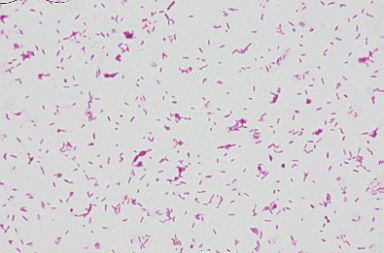BACTEROIDES
BACTEROIDES
(under the microscope)
 The Bacteroides genus of anaerobic bacteria comprise the majority of microorganisms that inhabit
the digestive tract. 50% of most fecal matter is actually Bacteroides fragilis cells!
Bacteroides organisms are the anaerobic counterpart of E. coli except they are somewhat smaller. They
grow well on blood agar, and under the microscope, they may contain large vacuoles that are similar in
appearance to spores. Members of Bacteroides species are not spore-forming, but they do produce a
very large capsule. Their pathogenicity is limited, however, because they possess no endotoxin in their cell
membrane. Infection only occurs after severe trauma to the abdominal region. Infection could lead to abscess
formation and possibly fever. Antibiotic treatment usually consists of metronidazole or clindamycin.
The Bacteroides genus of anaerobic bacteria comprise the majority of microorganisms that inhabit
the digestive tract. 50% of most fecal matter is actually Bacteroides fragilis cells!
Bacteroides organisms are the anaerobic counterpart of E. coli except they are somewhat smaller. They
grow well on blood agar, and under the microscope, they may contain large vacuoles that are similar in
appearance to spores. Members of Bacteroides species are not spore-forming, but they do produce a
very large capsule. Their pathogenicity is limited, however, because they possess no endotoxin in their cell
membrane. Infection only occurs after severe trauma to the abdominal region. Infection could lead to abscess
formation and possibly fever. Antibiotic treatment usually consists of metronidazole or clindamycin.
LABORATORY INDICATIONS (B. fragilis):
- Indole -
- Catalase +
- Esculin hydrolysis +
- Glucose fermentation
- Lactose +




Copyright © 1995 University of Texas - Houston Medical School, DPALM MEDIC, All rights reserved.
 The Bacteroides genus of anaerobic bacteria comprise the majority of microorganisms that inhabit
the digestive tract. 50% of most fecal matter is actually Bacteroides fragilis cells!
Bacteroides organisms are the anaerobic counterpart of E. coli except they are somewhat smaller. They
grow well on blood agar, and under the microscope, they may contain large vacuoles that are similar in
appearance to spores. Members of Bacteroides species are not spore-forming, but they do produce a
very large capsule. Their pathogenicity is limited, however, because they possess no endotoxin in their cell
membrane. Infection only occurs after severe trauma to the abdominal region. Infection could lead to abscess
formation and possibly fever. Antibiotic treatment usually consists of metronidazole or clindamycin.
The Bacteroides genus of anaerobic bacteria comprise the majority of microorganisms that inhabit
the digestive tract. 50% of most fecal matter is actually Bacteroides fragilis cells!
Bacteroides organisms are the anaerobic counterpart of E. coli except they are somewhat smaller. They
grow well on blood agar, and under the microscope, they may contain large vacuoles that are similar in
appearance to spores. Members of Bacteroides species are not spore-forming, but they do produce a
very large capsule. Their pathogenicity is limited, however, because they possess no endotoxin in their cell
membrane. Infection only occurs after severe trauma to the abdominal region. Infection could lead to abscess
formation and possibly fever. Antibiotic treatment usually consists of metronidazole or clindamycin.



